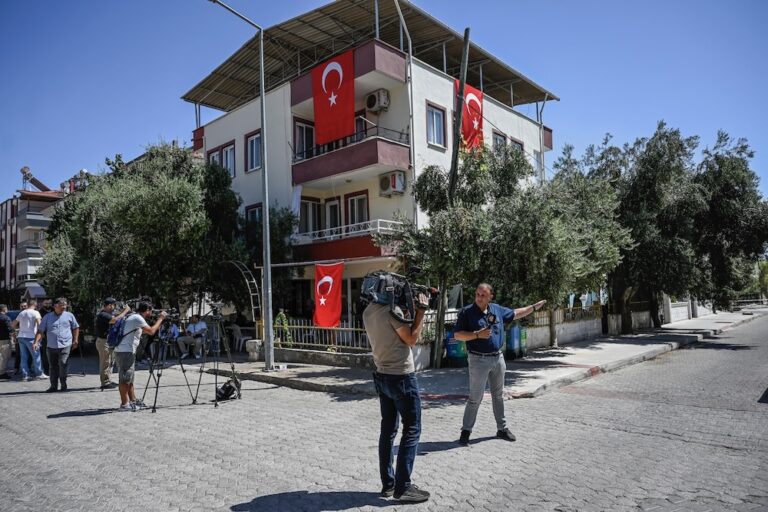The Dicle news agency reported that a plainclothes police officer instigated an attack by a group of demonstrators on two of its journalists.
(BIANET/IFEX) – On 18 July 2010, journalists Ismail Eskin and Çagdas Kaplan, of the Dicle News Agency (DIHA), were attacked by a large group of people when they were covering a demonstration in Küçükçekmece, a district on the European side of Istanbul. Eskin and Kaplan were taken to hospital. DIHA announced that the incident was orchestrated by a plainclothes police officer.
The journalists were in the Kanarya quarter of Küçükçekmece to gather information about a protest march against increased police operations targeting the provincial organization of the pro-Kurdish Peace and Democracy Party (BDP) and against the alleged desecration of bodies of members of the militant Kurdistan Workers Party (PKK) who were killed in armed conflicts.
As reported by DIHA, a group of demonstrators threw a Molotov cocktail and set an office on fire. At the same time, a person alleged to be a plainclothes police officer pointed to the journalists and told the others that they had organized the use of Molotov cocktails. A large group of demonstrators then attacked Eskin and Kaplan, DIHA announced.
The attackers tried to throw Kaplan into the burning office. When Eskin tried to stop them, he was beaten with a rod. It was also reported that the attackers grabbed one of the journalists’ cameras.
According to the news agency, the police as the party responsible for security measures remained as passive spectators of the assault. The journalists eventually managed to escape. Eskin suffered two blows to his head and a broken arm, Kaplan was beaten on various parts of his body.
The two journalists went to the Taksim First Aid Hospital for medical treatment. Eskin had a brain tomography taken in the Brain Surgery Emergency Service, while Kaplan was treated in the emergency room.
In a separate incident, on 17 July, journalist Mehmet Halis Is, of the Dogan News Agency (DHA), was the object of police violence when he was covering a protest by BDP members who were also demonstrating against the alleged desecration of the bodies of the PKK members killed in armed conflicts.
Is, who is also editor-in-chief of the local weekly “Midyat Habur” newspaper, was following the demonstration in Midyat, in the southeastern province of Mardin, where about 300 people had gathered in a park. Is followed the arrest of two elderly women carrying photographs of PKK members and of another two people who supposedly shouted illegal slogans.
Members of the BDP then initiated a sit-down protest in front of the District Police Directorate, calling for the release of the four arrested people.
While Is was taking pictures of the protest, a plainclothes police officer from the Police Directorate allegedly resorted to violence against him. Footage published on the website of the newspaper shows a person in plainclothes approaching the journalists and harshly scolding him, saying, “Why are you recording this?”
Is told BIANET, “We were all shooting footage. They tried to seize my camera and even to break it. They insulted us. Members of the BDP intervened. I might initiate legal action.”
In a written statement, Is said, “This physical intervention and the threats show once more that legal amendments are not very important. As long as the violence in the people’s minds is not being eliminated, the right to make news and obtain information based on human rights is not guaranteed.”
“We know that a free press means a free society. A society without press freedom is not a democratic and liberal society. According to the ECHR (European Court of Human Rights), a free press plays a vital role in the functioning of democracies. It is the duty of the press to inform the people on all topics of public interest,” Is declared.


